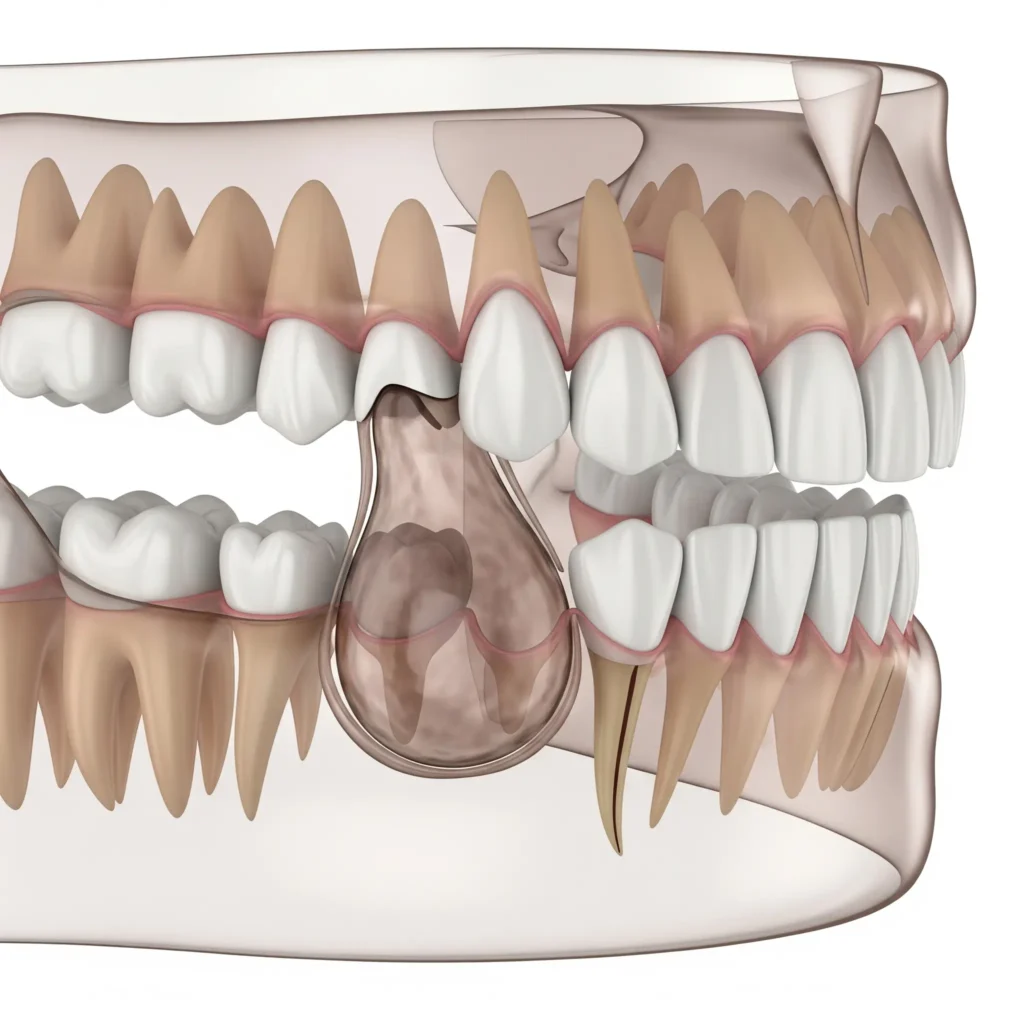Jaw cysts & tumors (odontogenic) are abnormal growths that develop in the jawbone or surrounding tissues, often arising from tooth-forming structures. While the term may sound concerning, most cases are treatable, especially when diagnosed early. By understanding the causes, symptoms, and treatment options, you can protect your oral health and ensure a strong, functional jaw for years to come.
Odontogenic jaw lesions are a group of cysts and tumors arising from tissues related to tooth development. These lesions can be benign or, in rare cases, more aggressive. They may cause swelling, pain, or changes in jaw shape, although some remain symptom-free for a long time.
Because many odontogenic jaw lesions grow slowly, they can go unnoticed without regular dental check-ups. Dental X-rays and advanced imaging techniques often reveal these lesions before they cause significant problems, allowing for more effective and less invasive treatments.
It’s also worth noting that these lesions can occur in any age group. While adults are more commonly affected, children and teenagers can also develop odontogenic cysts, particularly if they have impacted teeth.

Understanding the different types of jaw cysts & tumors (odontogenic) can help you recognize their impact and urgency of treatment:
Some of these lesions grow slowly without pain, while others can cause rapid changes in the jaw’s shape or bite alignment. This is why timely detection is critical.
Although some jaw cysts & tumors (odontogenic) are painless, others present noticeable signs:
Because these symptoms can also indicate other dental conditions, it’s important to seek professional evaluation promptly. Even small changes in your bite or jawline should not be ignored, as they may be the first indicators of underlying growths.
Dentists and oral surgeons rely on various diagnostic tools, including:
With accurate diagnosis, your dentist can create a targeted treatment plan for the best possible outcome. Advanced imaging also helps determine whether surrounding bone, teeth, or nerves are involved, guiding surgical planning.
Jaw cyst treatment varies depending on the size, type, and location of the lesion. Common approaches include:
While surgery is often the most effective treatment, your dentist will discuss all options, ensuring you feel informed and comfortable before moving forward. Post-treatment care may include antibiotics, pain relief measures, and follow-up scans to monitor healing.
Although not every jaw cyst & tumor (odontogenic) can be prevented, these steps significantly lower your risk:
Including these habits in your routine aids in early detection of potential problems and promotes better oral health. Regular check-ups help your dentist find small lesions before major structural damage occurs.
Recovery after treatment for jaw cysts & tumors (odontogenic) depends on the procedure’s extent. Simple cyst removal may allow a return to normal activity within weeks, while more extensive surgery can take longer. Following your dentist’s aftercare instructions, attending follow-up visits, and keeping up with healthy habits ensure lasting results.
Emotional well-being is equally important. Many patients feel more at ease when they understand each step of their treatment journey. Talking openly with your dental team, asking questions, and seeking reassurance when needed can make recovery less stressful and more empowering.
Jaw cysts & tumors (odontogenic) may seem intimidating, but with modern dental care, early detection, and proper treatment, most cases have highly favorable outcomes. Regular check-ups, preventive care, and timely intervention can make all the difference.
If you suspect any jaw abnormalities or want expert guidance, visit Unidental for advanced diagnostics, effective treatment options, and personalized dental care that prioritizes your comfort and long-term health.
No. Most are harmless, but some may grow aggressively if not treated.
Generally, no.They usually need professional care to avoid further complications.
Certain types, like odontogenic keratocysts, have higher recurrence rates, making follow-up care essential.
It varies from a few weeks to several months, depending on surgery type and bone healing.
Yes, some types can occur in younger patients, but early dental visits help detect and treat them quickly.
Hyderabad : +91 6305 971445
Anantapur: +91 70758 90089
Goa: +91 83266 32500
Mon to Sat 10:00AM to 8:00PM
Sun 10:00AM to 12:00PM
Lorem ipsum dolor sit amet, consectetur adipiscing elit. Ut elit tellus, luctus nec ullamcorper mattis, pulvinar dapibus leo.

Our goal is to provide friendly, caring dentistry with the highest standards in general, cosmetic, and specialist treatments. We strive to be the best dental hospital for comprehensive oral care.
We use advanced dental technology to deliver safe, precise, and painless treatments for every patient.